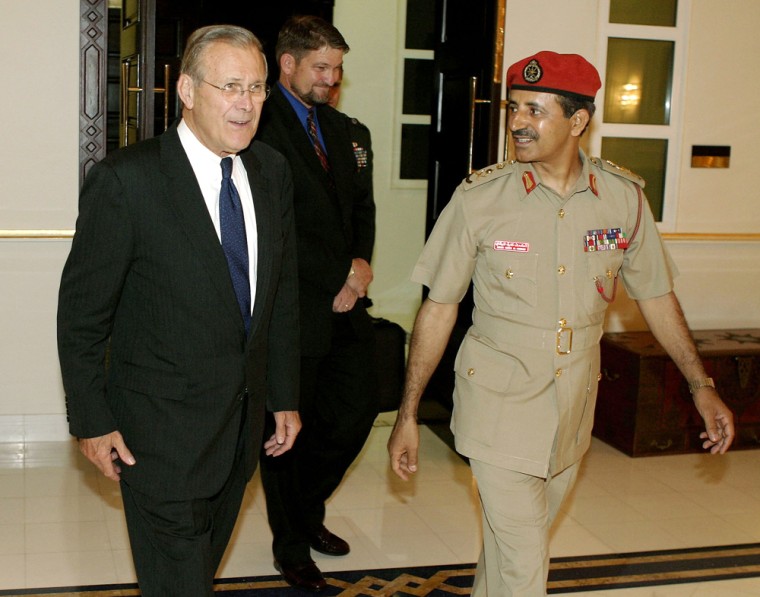Defense Secretary Donald H. Rumsfeld made an unannounced visit to Afghanistan on Wednesday to review preparations for the October presidential election and go over reconstruction and counternarcotics programs.
During a daylong visit, he planned consultations with Afghan and U.N. officials, as well as meetings with senior U.S. military officials.
Before flying to the Afghan capital, he said U.S.-led coalition forces are preparing a coordinated effort to attack the narcotics trade in the country, recognizing that drug income could be used to fund insurgents and terrorists in the country.
He offered few specifics, but noted the British government previously has taken the lead in working with President Hamid Karzai’s administration to address the drug trade in Afghanistan.
“There are plans being finished now,” Rumsfeld said Tuesday, in Oman for the first of several visits to U.S. allies in the region. “I don’t want to get into whose troops will do what.”
Opium poppy cultivation flourishing
The cultivation of opium poppies has resumed and flourished since 2001 in Afghanistan. It was largely eliminated under the Taliban’s religious policing, but farmers have resumed cultivating and harvesting the profitable crop in the chaos since the fall of the Taliban.
American military commanders in Afghanistan have said previously they don’t have enough troops to go after the poppy trade and still hunt Taliban and al-Qaida holdouts.
Rumsfeld seemed resigned that the poppy trade would continue to some degree, saying demand for the drug will always lead someone to create a supply. Heroin made from Afghan poppies generally reaches markets in Europe and Russia.
“All crops have been good the last two years,” he said of Afghanistan’s poppy cultivation. “It is a terrible thing. It produces great wealth for people who use it to harm society.”
The criminal elements are naturally opposed to a strong, democratic government in Afghanistan, he said. He also suggested drug money had ties to Taliban or al-Qaida, but provided no concrete information to back that up.
U.N. surveys estimate Afghanistan accounted for three quarters of the world’s opium last year, and the trade brought in $2.3 billion, more than half of the nation’s gross domestic product. New surveys suggest even more has been planted this year, with Robert Charles, the State Department’s top counternarcotics official, saying Afghanistan may be on pace for a world record opium poppy crop this year.
Rumsfeld: Look to Colombian model
Rumsfeld pointed to the drug war in Colombia as a partial model for efforts in Afghanistan. There, U.S.-trained military forces attack narcotics smuggling routes while the Colombian government tries to eradicate coca growth in the farmlands through aerial spraying.
The costly Colombian campaign, a $3.3 billion, five-year military aid package known as Plan Colombia, has provided Colombian forces with training, equipment and intelligence. It has led to a huge increase in drug seizures, and closer judicial cooperation between the countries has led to the extradition of 120 alleged drug traffickers to the United States for trial in two years.
Despite the progress, cocaine prices on U.S. streets remain unchanged, a sign that there is no shortage of the drug. And the program to fly crop dusters over Colombian coca fields and spray them with herbicides has drawn sharp criticism from environmental and other groups.
Meanwhile, Rumsfeld hailed Afghanistan’s efforts to prepare for presidential elections in October, citing figures saying more than 9 million Afghans have registered to vote, including 3.5 million women.
“If those numbers prove out, that’s an enormously successful registration process,” he said.
Karzai is clearly the American favorite, but Rumsfeld and other officials have avoided endorsing him, saying the U.S. government will work with whomever the Afghan voters choose.
